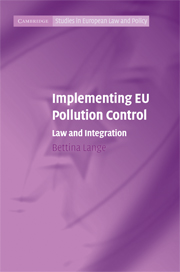Book contents
- Frontmatter
- Contents
- Series editors’ preface
- Acknowledgements
- Update on the IPPC Directive
- Abbreviations
- 1 Introduction
- 2 Traditional perspectives on the role of law in EU integration
- 3 Critical perspectives on the role of law in EU integration
- 4 What is EU ‘law in action’?
- 5 Talking interests – generating procedure: How political discourse constructs key aspects of BAT determinations in BREFs
- 6 Variation in open and closed BAT norms
- 7 What does it cost? Economic discourse in the determination of ‘the best available techniques’ under the IPPC directive
- 8 Does ‘law’ integrate? Licensing German and English coke ovens under the IPPC Directive
- 9 Conclusion
- Appendix: Methodology
- Bibliography
- Index
8 - Does ‘law’ integrate? Licensing German and English coke ovens under the IPPC Directive
Published online by Cambridge University Press: 07 August 2009
- Frontmatter
- Contents
- Series editors’ preface
- Acknowledgements
- Update on the IPPC Directive
- Abbreviations
- 1 Introduction
- 2 Traditional perspectives on the role of law in EU integration
- 3 Critical perspectives on the role of law in EU integration
- 4 What is EU ‘law in action’?
- 5 Talking interests – generating procedure: How political discourse constructs key aspects of BAT determinations in BREFs
- 6 Variation in open and closed BAT norms
- 7 What does it cost? Economic discourse in the determination of ‘the best available techniques’ under the IPPC directive
- 8 Does ‘law’ integrate? Licensing German and English coke ovens under the IPPC Directive
- 9 Conclusion
- Appendix: Methodology
- Bibliography
- Index
Summary
Introduction
This chapter further develops analysis of the relationships between law and integration. Chapter 2 argued that a range of political scientists and lawyers consider positive state law – closed legal rules differentiated from their social, political and economic environment – to be central to EU integration processes. Hence ‘integration through law’ has been a key theme in the literature on EU integration. Chapter 3 critically analysed this theme with reference to the literature on new forms of EU governance. This literature draws attention to ‘integration without formal state law’ because EU institutions increasingly resort to ‘soft’ law as well as combinations of ‘soft’ and ‘hard’ law. Soft law includes various forms of non-binding guidelines, recommendations, opinions, circulars, benchmarking and exchange of best practices, as practised in open methods of coordination. Increasing resort to Framework Directives has also been considered as an element of new forms of EU governance. Framework Directives do not seek to impose specific, detailed, prescriptive ‘hard’ EC law obligations upon member states, but only spell out legal obligations for member states in outline. Chapter 5 further questioned the argument for ‘integration through law’ on the basis of empirical data. I suggested that the implementation of the IPPC Directive in fact not only generates traditional, closed ‘hard’ state law, but also open BAT norms, which do not conform to the image of law invoked in the literature on ‘integration through law’.
Information
- Type
- Chapter
- Information
- Implementing EU Pollution ControlLaw and Integration, pp. 227 - 263Publisher: Cambridge University PressPrint publication year: 2008
